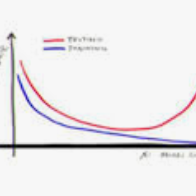Social media have great potential for enabling public discourse on important societal issues. However, adverse effects, such as polarization and echo chambers, greatly impact the benefits of social media and call for algorithms that mitigate these effects. In this paper, we propose a novel problem formulation aimed at slightly nudging users' social feeds in order to strike a balance between relevance and diversity, thus mitigating the emergence of polarization, without lowering the quality of the feed. Our approach is based on re-weighting the relative importance of the accounts that a user follows, so as to calibrate the frequency with which the content produced by various accounts is shown to the user. We analyze the convexity properties of the problem, demonstrating the non-matrix convexity of the objective function and the convexity of the feasible set. To efficiently address the problem, we develop a scalable algorithm based on projected gradient descent. We also prove that our problem statement is a proper generalization of the undirected-case problem so that our method can also be adopted for undirected social networks. As a baseline for comparison in the undirected case, we develop a semidefinite programming approach, which provides the optimal solution. Through extensive experiments on synthetic and real-world datasets, we validate the effectiveness of our approach, which outperforms non-trivial baselines, underscoring its ability to foster healthier and more cohesive online communities.
翻译:暂无翻译




